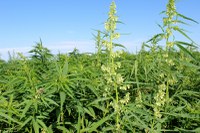Farmers Should Have Plan in Place Before Planting Industrial Hemp
(Click the image below to view a high-resolution image that can be downloaded)
North Dakota farmers interested in growing industrial hemp in 2019 can begin the state licensing process, but they should have a marketing plan in place before planting, North Dakota State University Extension bioenergy economics specialist David Ripplinger advises.
“This is especially true as domestic industrial hemp markets are still in their infancy and there is a relative absence of cash hemp markets for farmers to sell their crop,” he says.
Although the production of hemp remains regulated, many North Dakota farmers have expressed interest in growing industrial hemp because commercial production of the crop was legalized in the 2018 farm bill.
Growers will need a license from the North Dakota Department of Agriculture, which oversees compliance in the state, before purchasing seed or plants.
The first step of the licensing process requires a criminal background check and a project proposal that outlines how hemp seeds or plants will be obtained, and where and how production, harvesting and material disposal will be managed. These steps can be completed now.
The second step, which includes the grower license application, signed memorandum of understanding and per-acre application fee, is expected to be open soon.
Ripplinger also cautions producers to check the background of buyers and their ability to meet contractual promises, as well as understand the specific terms of production contracts they may enter into.
Some buyers may have weak or uncertain financial standing, or may be relying on marketing hemp products for uses that are not approved at the federal level, such as selling cannabidiol (CBD) as a food ingredient. Farmers who sell their crop typically are unsecured creditors if the buyer/processor were to declare bankruptcy.
Contract terms such as “contracted quantity and quality,” and the impacts of forces outside the farmer or buyer/processor’s control, such as ”acts of God” and “force majeure,” are of concern to producers, Ripplinger says.
A short crop may leave a farmer unable to meet contract minimums, while a long crop may leave a farmer without a buyer for the excess. Both situations are worse for specialty crops when a functioning cash market to buy or sell the crop does not exist.
The absence of an act of God clause where weather or pests limit production may require a farmer to provide the buyer the promised amount or financial equivalent. A force majeure clause covers an event or situation outside the control of buyers/processors that may leave them in a position where they no longer are required to receive or pay for the contracted production.
NDSU Agriculture Communication – March 29, 2019
| Source: | Dave Ripplinger, david.ripplinger@ndsu.edu, 701-231-5265 |
|---|---|
| Source: | Frayne Olson, frayne.olson@ndsu.edu, 701-231-7377 |
| Editor: | Kelli Anderson, kelli.c.anderson@ndsu.edu, 701-231-6136 |


